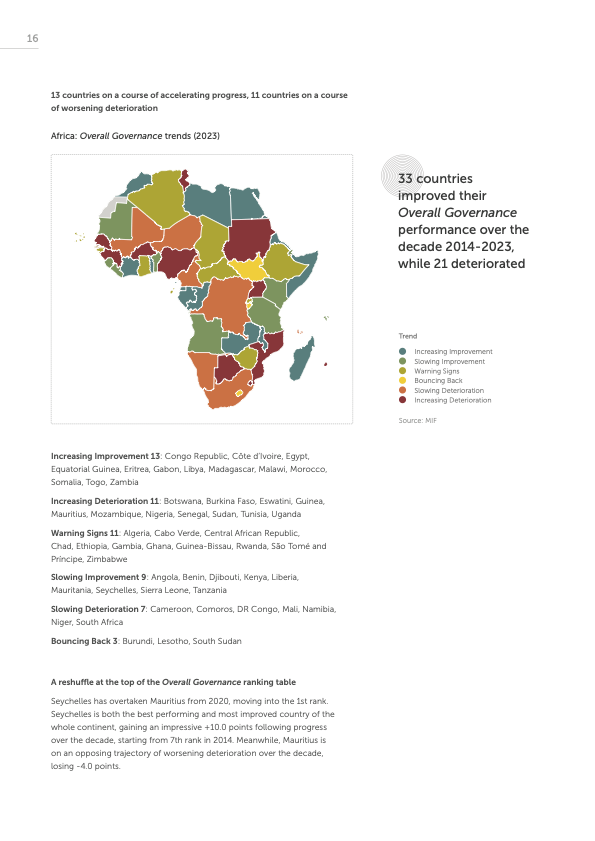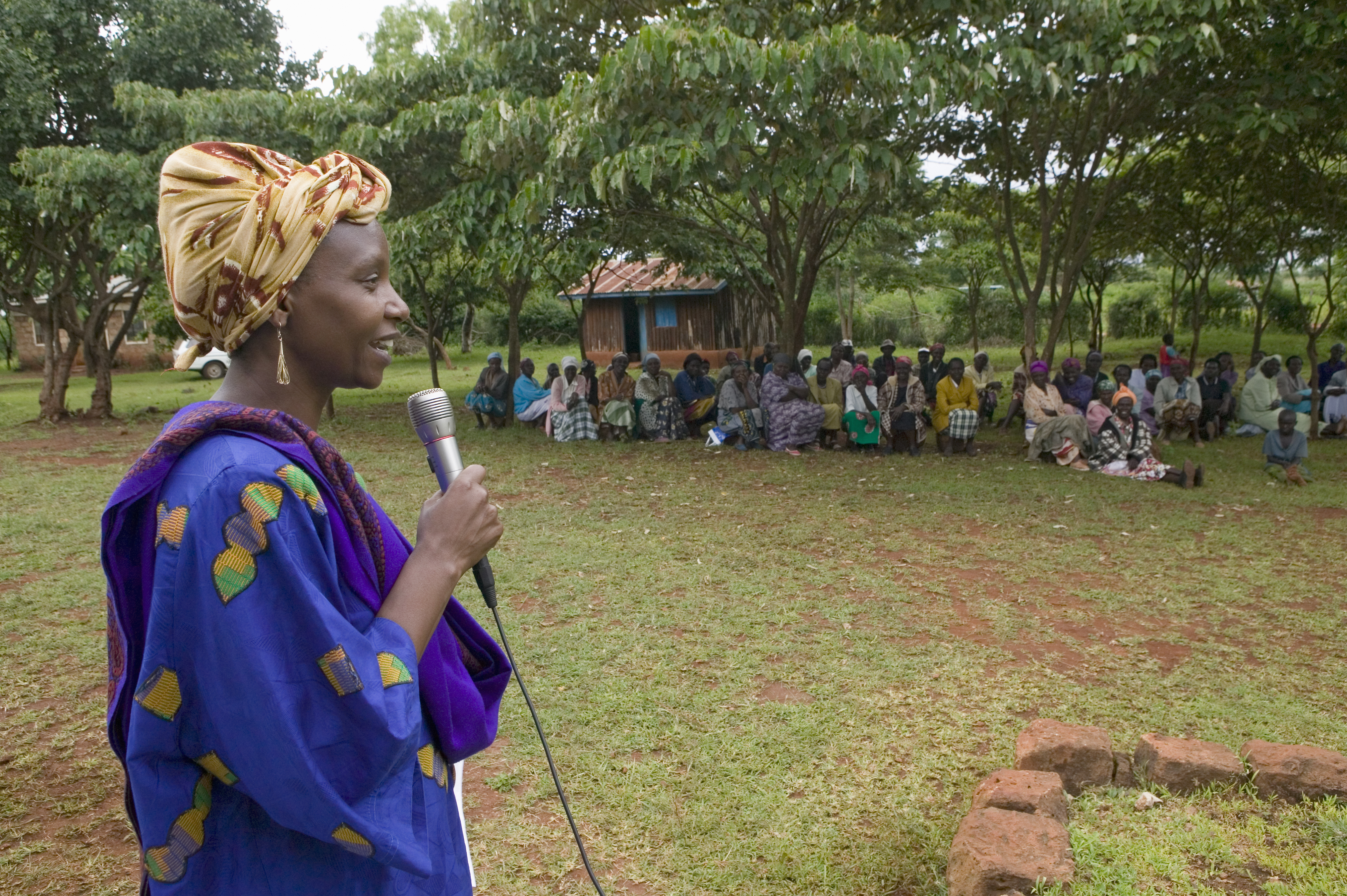Introduction
Over the past few years, the African governance landscape has seen progress and setbacks. Many countries are making policy and investment efforts to advance digital transformation. The 2024 Ibrahim Index of African Governance (IIAG) shows that while over half of African nations have improved in key areas over the past decade, the continent’s overall governance has stagnated. In particular, civic participation and the issue of rights and inclusion have declined, signalling a growing disconnect between citizens and the institutions meant to serve them (Mo Ibrahim Foundation, 2024).
Democracy requires spaces where people can meaningfully engage with the state. When citizens feel their voices matter in decision-making, they’re far more likely to support government policies. Yet across Africa, we’re seeing these vital democratic spaces disappear.

The 2023 IIAG report confirms this troubling trend – as civic participation shrinks, social tensions rise and public trust in institutions weakens. This democratic backsliding couldn’t come at a worse time, with Africa’s cities growing at unprecedented rates. Experts project that by 2050, 6 in 10 Africans will live in urban areas (African Union, 2024), creating new pressures on governance systems already struggling to maintain public confidence.
The challenge is that urbanization is outpacing the economic growth rate for these cities, widening the gap between the growing population and essential services. Consequently, issues such as high unemployment, growing informality, and gentrification make the need for good and inclusive governance urgent (Kamana, Radoine & Nyasulu, 2024). Unfortunately, neoliberal urban interests make governments prioritize market-driven economic development over public needs, deepening the disconnect between citizens and the state. Additionally, as projections show, by 2050, the continent’s population will hit 2.5 billion, and over 34% of that population will constitute youths aged 15–24 (UN DESA, 2024; Bekele-Thomas & Westgaard, 2024). This younger, increasingly urban population uses digital platforms for education, employment, and entrepreneurship, and for political expression. As seen in recent times, movements such as Kenya’s 2024 #FinanceBillProtests and Nigeria’s EndSARS campaign illustrate how digital tools empower citizens, especially youths, to demand state accountability (Amnesty International, 2021; Twinomurinzi, 2024).
Urban Africa in the Digital Age: Governance, Growth, and Gaps
As African cities grow into centres of political and economic activity, digital technologies show increasing potential to improve service delivery, boost civic engagement, and address urban issues. While not a magic solution, digital transformation across the continent is bringing exciting solutions to governance and development. For digital transformation to truly be inclusive, development must address existing infrastructural and social limitations. Limitations that are left without deliberate intervention can end up worsening existing urban inequalities.
Globally, digital solutions like the Internet of Things (IoT), artificial intelligence (AI), and blockchain technologies are increasingly reimagining governance. In Europe, for instance, theEuropean Blockchain Services Infrastructure (EBSI) improves public accessibility and data integration (Kasimatis et al., 2022).

In Nairobi, IoT sensors and AI monitor and enhance transport systems (Mahugu and Mambo, 2024). AI-driven analytics now help municipalities better predict and respond to disasters like flooding, improving disaster management plans (Martin, 2024). The anticipated urban population growth of African cities, which points to increased infrastructural constraints, informality, and unemployment, makes these technological innovations critical for sustainable and inclusive development on the continent.
Digital technology has the potential to open up participatory spaces and improve public engagement, thereby enhancing transparency, accessibility, and accountability in state and urban governance
But while the policy landscape for digital transformation in Africa is improving, available data, such as the 2024 Network Readiness Index, shows that the continent still lags internationally (Teleanu and Kurbalija, 2022; Portulans Institute, 2024). At the transnational level, the African Union has laid ambitious groundwork through its Digital Transformation Strategy (2020–2030) and Continental AI Strategy (African Union, 2020, 2024).
Notable efforts are also observed across AU member states in developing national AI strategies (Akana and King’Ori, 2024). However, for the continent to advance and compete globally, digital transformation strategies must push reform beyond policy formulation and pursue effective implementation. Without this, infrastructural, economic, and regulatory constraints will continue to affect development. The uneven pace of national AI policy development across the continent raises concerns about the impact of regional disparities.
African countries should pursue collaborations to ensure the digital divide both within the continent and globally is addressed.
Civic Engagement in the Digital Era: Opportunities and Challenges in Africa
Digital technology is improving and creating new spaces and channels for engagement between states and their citizens. It is supporting governments to deliver services more efficiently and transparently. Digital technology has the potential to not only bring the public closer to the decision-making process but also foster public trust in state institutions and democratic decision making.However, developing and expanding such solutions requires investment and commitment to ensure that lack of access or skills does not marginalize individuals or communities.
Social media, for instance, have emerged as powerful platforms for public mobilization. The likes of TikTok, Facebook, and X provide platforms for citizens, especially youths, to share their political ideas and frustrations online. In Nigeria, for instance, the 30-Day Rant Challenge gained traction online as youths took to social media to voice their frustrations with the current government and the state of economic hardship in the country (Sahara Reporters, 2025).
Movements such as Kenya’s 2024 #FinanceBillProtests and Nigeria’s EndSARS campaign further demonstrate how digital platforms amplify public discourse in the demand for state accountability. Social media activism has helped in amplifying the voices of citizens beyond their local communities. Also, where traditional media gets co-opted by oppressors, social media provides a platform for movements to expose corruption and human rights violations.
When authorities, instead of listening to and working with their citizens, choose intimidation tactics to respond, like internet shutdowns, intimidation of protesters, and restrictive cyber laws, they limit the full potential of such spaces for public engagement.It is important to note, too, that social media activism alone can hardly bring about the actual change required to better the lives of people, but it has the potential to bring awareness to pressing issues affecting communities. It can also harness the power of the public to demand change. As such, policies must support advancing digital rights and prevent governments from repressive responses.
There is also a need to collaborate with technology companies to ensure platform data security and prevent misuse. The potential of digital technology to advance good and inclusive governance extends beyond activism to practical governance solutions. Crowdsourcing platforms like Ushahidi demonstrate the power of citizen-led data collection in tracking governance failures and service delivery gaps (Ushahidi, n.d). By institutionalizing such ideas within governance frameworks, citizen-reported data can translate into timely government action informed by contextual needs.
Also, E-governance platforms such as Rwanda’s Irembo illustrate how digital transformation can improve access to public services and reduce bureaucratic inefficiencies (Irembo, n.d). However, the effectiveness of such platforms depends on the widespread internet access and digital literacy; access and usability end up becoming inequitable. Bridging the digital divide through targeted literacy programs and affordable internet access will ensure that e-government initiatives are inclusive and accessible to all citizens.
Reimagining Democracy in Africa’s Digital Future
Africa’s democracy and governance can be reimagined with the help of digital technologies. Given the continent’s urban and demographic forecasts, technology can contribute to realizing a vibrant and inclusive future. With intentional efforts put towards addressing current and potential barriers to inclusive and ethical digital transformation, digital solutions can present a unique opportunity to reimagine the future state of governance on the continent.
Africa’s digital revolution can benefit from its diverse creativity. It is important to look inward for solutions and innovations rather than focusing too much on global trends. Community-led innovations, as demonstrated by platforms like Ushahidi that arise out of contextual necessity, can help address real and pressing community issues. As such, if digital transformation is to truly and meaningfully improve governance, it must understand and work with communities to address their needs.
The policies we design must aim to uphold ethical standards. Policies must prioritize equitable digital access, digital literacy, and the preservation of online rights and freedoms. By so doing, innovations can avoid exacerbating already-existing inequalities. African nations are capable of leveraging technology to better democracy, and promote governance that is meaningfully participatory. Digital transformation can help reimagine governance in Africa, but only through committed leadership. Closing the gap between possibility and progress will require targeted investments, political will, and safeguards against repression. It is not a matter of whether Africa can capitalize on digitalization to govern, but rather how it can take advantage of this chance to rethink and reimagine democracy for the future.
References
African Union. (2020). The Digital Transformation Strategy for Africa (2020-2030) | African Union. https://au.int/en/documents/20200518/digital-transformation-strategy-africa-2020-2030
African Union. (2024, September 4). Africa Urban Forum: Co-creating solutions to make cities habitable for the growing population. https://au.int/en/pressreleases/20240904/africa-urban-forum-co-creating-solutions-
make-cities-habitable-growing
Akana, C., & King’Ori, M. (2024, November). The African Union’s Continental AI Strategy:
Data Protection and Governance Laws Set to Play a Key Role in AI Regulation—Future of Privacy Forum. Future of Privacy Forum. https://fpf.org/blog/global/the-african-unions-continental-ai-strategy-data-protection-and-governance-laws-set-to-play-a-key-role-in-ai-regulation/
Barrett, G. (n.d.). The digital divide in sub-saharan Africa: A barrier to quality education and
information access. Bizcommunity. Retrieved February 12, 2025, from https://www.bizcommunity.com/article/the-digital-divide-in-sub-saharan-africa-a-barrier-to-quality-education-and-information-access-019625a
Bekele-Thomas, N., & Westgaard, S. (2024, October 4). Unlocking the potential of Africa’s youth. Africa Renewal. https://www.un.org/africarenewal/magazine/october-2024/unlocking-potential-africa%E2%80%99s-youth
Cariolle, J., Elkhateeb, Y., & Maurel, M. (2024). Misinformation technology: Internet use and political misperceptions in Africa. Journal of Comparative Economics, 52(2), 400–433. https://doi.org/10.1016/j.jce.2024.01.002
Ibrahim Mo Foundation. (2024). Ibrahim Index of African Governance (IIAG) 2024.https://mo.ibrahim.foundation/our-research/iiag
Irembo. (n.d). IremboGov. IremboGov. https://irembo.gov.rw/home/citizen/all_services?lang=en
Kamana, A. A., Radoine, H., & Nyasulu, C. (2024). Urban challenges and strategies in African cities – A systematic literature review. City and Environment Interactions, 21, 100132. https://doi.org/10.1016/j.cacint.2023.100132
Kasimatis, D., Buchanan, W. J., Abubakar, M., Lo, O., Chrysoulas, C., Pitropakis, N.,
Papadopoulos, P., Sayeed, S., & Sel, M. (2024). Transforming EU Governance: The Digital Integration through EBSI and GLASS (No. arXiv:2212.03218). arXiv. https://doi.org/10.48550/arXiv.2212.03218
Maclay, L. (2024, July 17). Participatory Budgeting is Key to Good Governance in Kenya. Center for International Private Enterprise. https://www.cipe.org/blog/2024/07/17/kenyas-2024-finance-bill-participatory-budgeting-is-key-to-good-governance/
Mahugu, J., & Mambo, S. (2024). (PDF) Real Time Smart Road Traffic Flow Management System in a Developing Country. ResearchGate. 1st African Transport Research, Cape Town, South Africa. https://www.researchgate.net/publication/379259894_Real_Time_Smart_Road_Traffic_Flow_Management_System_in_a_Developing_CountryMartin, N. (2024, November 1). Harnessing the Power of Artificial Intelligence for Effective Natural Disaster Management in Africa. https://www.researchgate.net/publication/385420098_Harnessing_the_Power_of_Artificial_Intelligence_for_Effective_Natural_Disaster_Management_in_Africa
Mazibuko, A. (2023, May 31). Africa’s Digital Gender Divide. ACCORD. https://www.accord.org.za/analysis/africas-digital-gender-divide/
Portulans Institute. (2024). Network Readiness Index 2024 (Network Readiness Index, p.
284). Portulans Institute. https://networkreadinessindex.org/analysis/#theme
Sahara Reporters. (2025). Sowore Asks Nigerians To Join #30DayRantChallenge As More Citizens Express Anger, Frustrations Under Tinubu Govt. Sahara Reporters. https://saharareporters.com/2025/03/22/sowore-asks-nigerians-join-30dayrantchallenge-more-citizens-express-anger-frustrations
Teleanu, S., & Kurbalija, J. (2022). Africa digital foreign policy and diplomacy—Diplo Resource (p. 204). DiPLO Foundation. https://www.diplomacy.edu/resource/report-
stronger-digital-voices-from-africa/
Twinomurinzi, H. (2024). From Tweets to Streets: How Kenya’s Generation Z (Gen Z) is Redefining Political and Digital Activism. African Conference on Information Systems and Technology.
https://digitalcommons.kennesaw.edu/acist/2024/presentations/13 United Nations Department of Economic and Social Affairs, Population Division. (2024).
World Population Prospects 2024 | Population Division. United Nations Publication.
Ushahidi. (n.d). Crowdsourcing Solutions to Empower Communities. Ushahidi.






